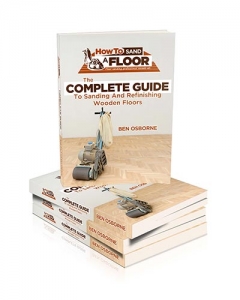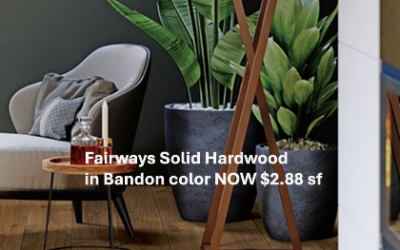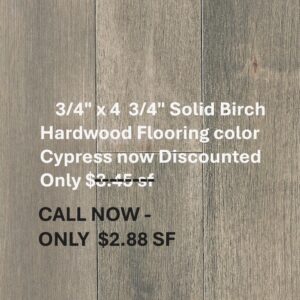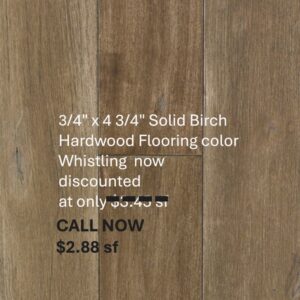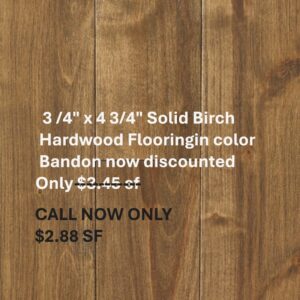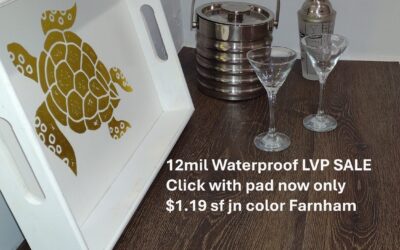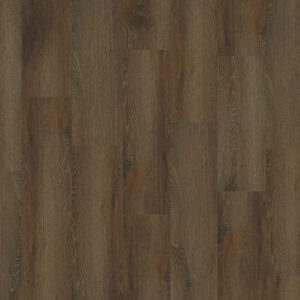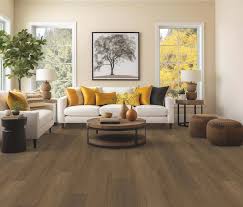When it comes to choosing the right flooring for your home, durability and longevity are key factors to consider. You want something that not only looks great but can also withstand the test of time and daily wear and tear. In this article, we will explore some tips and tricks to help you maximize the durability of your flooring, ensuring that it remains in excellent condition for years to come. Whether you have hardwood, laminate, vinyl, or tile, these insights from Absolute Flooring, a trusted flooring company, will help you make informed decisions and maintain your floors in pristine condition.
Choosing the Right Flooring Material
When it comes to choosing the right flooring material for your home, a variety of factors need to be considered. From foot traffic to environmental factors to maintenance requirements, each aspect plays a crucial role in determining the best flooring option for you. By carefully evaluating these aspects, you can ensure that your flooring not only enhances the aesthetics of your space but also maximizes durability and longevity.
Consider the Foot Traffic
One of the first factors to consider when choosing flooring materials is the level of foot traffic in different areas of your home. High-traffic areas such as hallways, entryways, and living rooms require flooring that can withstand frequent use and heavy impact. In contrast, low-traffic areas like bedrooms may not require as durable flooring options. By understanding the foot traffic in each area, you can choose the flooring material that suits your specific needs.
Assess the Environmental Factors
Environmental factors such as humidity, temperature, and exposure to sunlight can significantly impact the longevity of your flooring. It is crucial to choose a material that can withstand these conditions to prevent warping, fading, or other forms of damage. For example, in areas with high humidity levels such as bathrooms or basements, selecting flooring materials that are resistant to moisture is essential. Similarly, rooms with large windows or direct sunlight may require flooring options that are UV-coated to resist fading.
Evaluate the Maintenance Requirements
Another vital factor to consider is the level of maintenance required for different types of flooring. Some materials demand regular upkeep, while others are relatively low maintenance. By understanding your willingness and ability to commit to maintenance, you can choose a flooring material that matches your lifestyle. Factors to consider include the frequency of cleaning, the type of cleaning products needed, and the overall effort required to maintain the appearance and longevity of the flooring.
Hardwood Flooring
Hardwood flooring is a classic and timeless choice that adds warmth and elegance to any space. When selecting hardwood flooring, several considerations can help you make the right choice.
Selecting the Right Wood Species
The choice of wood species can significantly impact the durability and appearance of your hardwood floors. Different species have varying levels of hardness, color, and grain patterns. For high-traffic areas, selecting hardwood from harder species like oak or maple is advisable to minimize scratches and dents. Softer species like pine or birch are more suitable for low-traffic areas.
Opting for Engineered Hardwood
Engineered hardwood is an alternative to solid hardwood that offers enhanced stability and resistance to moisture. It consists of a real wood veneer layer on top of a plywood or high-density fiberboard (HDF) core. Engineered hardwood is less prone to warping or expanding due to changes in temperature and humidity, making it a suitable choice for areas with fluctuating environmental conditions.
Choosing a Durable Finish
The finish applied to hardwood flooring plays a significant role in protecting it from daily wear and tear. There are various finishes available, each offering different levels of durability. The most common options include oil-based polyurethane, water-based polyurethane, and aluminum oxide finishes. Oil-based polyurethane provides a traditional, rich look but requires periodic maintenance. Water-based polyurethane is more durable and dries quicker but may not produce the same depth of color. Aluminum oxide finishes are exceptionally durable and are often found on prefinished hardwood flooring.
Laminate Flooring
Laminate flooring is a versatile and cost-effective option that mimics the look of natural materials such as hardwood or stone. When considering laminate flooring, the following factors are worth considering.
Understanding AC Rating
The AC rating is a measure of laminate flooring’s durability and suitability for different levels of foot traffic. The scale ranges from AC1 for light residential use to AC5 for heavy commercial use. Depending on the area of installation and level of foot traffic, you can choose a laminate flooring option with an appropriate AC rating to ensure longevity and durability.
Choosing a Thick Laminate
The thickness of laminate flooring can also impact its durability. Thicker laminate planks are more resistant to wear and damage, making them a better choice for high-traffic areas. A thickness of 8mm or more is generally considered suitable for residential applications, whereas thicker options may be more appropriate for commercial spaces.
Considering Moisture Resistance
Laminate flooring is not inherently water-resistant, although some options come with improved moisture resistance. When installing laminate in areas prone to spills or high moisture levels, it is essential to choose a product with a moisture-resistant core or an added moisture barrier. This will help prevent warping or damage caused by exposure to water.
Vinyl Flooring
Vinyl flooring has gained popularity in recent years due to its durability, affordability, and wide range of design options. When exploring vinyl flooring, the following factors should be taken into account.
Evaluating Wear Layer Thickness
The wear layer is a protective coating on vinyl flooring that helps resist scratches, stains, and other forms of wear. Thicker wear layers typically offer greater durability and longevity. For residential use, a wear layer thickness of 12mil or higher is recommended, whereas commercial spaces may require a thicker wear layer to withstand heavier foot traffic.
Opting for Luxury Vinyl Plank
Luxury vinyl plank (LVP) is a premium vinyl flooring option that replicates the look of hardwood planks. LVP offers enhanced durability, water resistance, and ease of maintenance. It is an excellent choice for high-traffic areas or households with pets and children. The use of advanced printing techniques ensures that LVP closely resembles the natural wood species it mimics.
Considering Waterproof Vinyl
Waterproof vinyl flooring is specifically designed to withstand moisture and spills without incurring damage. This type of vinyl flooring is an ideal choice for areas prone to water exposure, such as bathrooms, kitchens, or basements. Waterproof vinyl features a waterproof core, preventing the growth of mold or mildew and ensuring long-lasting performance.
Tile Flooring
Tile flooring offers durability, versatility, and an extensive selection of designs, making it a popular choice for residential and commercial spaces. When selecting tile flooring, several factors can help you choose the most suitable option.
Choosing Porcelain or Ceramic Tiles
Porcelain and ceramic are two common types of tile materials, each with its own advantages. Porcelain tiles are denser, more water-resistant, and suitable for both indoor and outdoor use. Ceramic tiles, while slightly less dense, offer a wide variety of colors, designs, and finishes. Understanding the specific requirements of your space will help determine whether porcelain or ceramic tiles are the best choice.
Considering the PEI Rating
The Porcelain Enamel Institute (PEI) rating is a measure of a tile’s resistance to abrasion and wear. The rating ranges from PEI 0, indicating no foot traffic, to PEI 5, indicating heavy commercial use. For residential spaces, tiles with a PEI rating of 3 or 4 are generally sufficient. Higher ratings are recommended for areas with heavy foot traffic, such as commercial buildings or outdoor applications.
Selecting Larger Tile Sizes
The size of the tiles can have both functional and aesthetic implications. Larger tiles can create an illusion of spaciousness, require fewer grout lines, and may be easier to clean. However, it is important to consider the dimensions of your space and the design you want to achieve. While larger tiles can offer benefits, smaller tiles may be more suitable for intricate patterns or designs.
Carpet Flooring
Carpet flooring provides a soft and cozy feel underfoot while enhancing the visual appeal of a room. When choosing carpet, the following factors should be taken into consideration.
Choosing a Durable Carpet Fiber
Carpet fibers play a significant role in determining the durability and longevity of carpet flooring. Common carpet fiber options include nylon, polyester, olefin, and wool. Nylon is known for its strength and resilience, making it an excellent choice for high-traffic areas. Polyester offers exceptional stain resistance and vivid colors. Olefin is highly resistant to moisture and stains, making it suitable for areas prone to spills. Wool, a natural fiber, provides luxurious softness and durability but requires more maintenance.
Considering the Twist Level
The twist level refers to the number of times the carpet fibers are twisted per inch. Higher twist levels generally result in more durable and resilient carpets. This is because tighter twists create a stronger structure that resists matting and crushing. Considering the twist level of carpet fibers can help ensure that your carpet retains its appearance and durability over time.
Opting for Stain-Resistant Carpets
Stains are a common concern when it comes to carpet flooring, especially in high-traffic areas or homes with children or pets. Opting for stain-resistant carpets can help minimize the impact of spills and accidents. Many carpet manufacturers offer carpets with built-in stain resistance treatments, which provide an additional layer of protection against stains and make cleaning easier.
Concrete Flooring
Concrete flooring offers durability and a sleek, modern look. When considering concrete flooring, the following factors can help you achieve a flooring solution that maximizes its potential.
Installing Epoxy Coatings
Epoxy coatings are a popular option for enhancing the durability and aesthetic appeal of concrete floors. Epoxy creates a seamless, resistant surface that is easy to maintain and highly resistant to stains, chemicals, and abrasion. It can be applied in a variety of colors and finishes, allowing you to customize your concrete flooring to suit your design preferences.
Applying Sealers and Protectors
Sealing the concrete floor is essential to prevent moisture penetration, staining, and damage. There are various types of sealers available, such as penetrating sealers, acrylic sealers, and epoxy sealers. The choice of sealer depends on the intended use of the space and the desired appearance. Applying a sealer will help protect your concrete flooring and extend its lifespan.
Considering Concrete Scored Patterns
Concrete scoring involves creating patterns or designs on the surface of the concrete floor. This can be achieved by using a scoring tool to create lines, shapes, or even intricate patterns. Concrete scoring adds visual interest to the floor and can help disguise imperfections or cracks. By selecting an appropriate pattern, you can enhance the aesthetics of your concrete flooring while maximizing its durability.
Bamboo Flooring
Bamboo flooring is a sustainable and eco-friendly option that offers durability and a unique look. When considering bamboo flooring, the following factors should be taken into account.
Evaluating Bamboo Hardness
Bamboo flooring’s hardness is an essential consideration to ensure its longevity and resistance to daily wear and tear. Bamboo flooring is typically rated using the Janka hardness scale, which measures the force required to embed a steel ball into the surface of the material. The higher the Janka rating, the harder the bamboo flooring. Bamboo with a higher Janka rating, such as strand-woven bamboo, is more resistant to scratches and dents, making it suitable for high-traffic areas.
Choosing Strand-Woven Bamboo
Strand-woven bamboo is a premium bamboo flooring option known for its exceptional hardness and durability. It is made by compressing strands of bamboo together with resin, resulting in a dense and stable material. Strand-woven bamboo offers excellent resistance to scratches, dents, and moisture, making it well-suited for areas with heavy foot traffic or fluctuating environmental conditions.
Opting for UV-Coated Bamboo
Exposure to sunlight can cause bamboo flooring to fade or discolor over time. UV-coated bamboo flooring is treated with a protective layer that helps prevent UV damage and maintains the color and appearance of the flooring. By choosing UV-coated bamboo, you can ensure that your flooring retains its beauty and durability for years to come.
Cork Flooring
Cork flooring is a natural and environmentally friendly option that offers warmth and comfort. When considering cork flooring, the following factors can help you make an informed decision.
Choosing a Thick Cork Layer
The thickness of the cork layer in cork flooring impacts its durability and longevity. Thicker cork layers provide better insulation, improved sound absorption, and increased resistance to wear. Cork flooring with a thickness of 6mm or more is generally recommended for residential use, while thicker options may be more suitable for commercial spaces or areas with heavy foot traffic.
Opting for Pre-finished Cork
Pre-finished cork flooring is factory-finished with coatings that protect the surface from scratches, stains, and moisture. It eliminates the need for additional time-consuming finishing steps after installation and ensures that the flooring is ready for use immediately. Pre-finished cork offers enhanced durability and ease of maintenance, making it a convenient choice for homeowners.
Considering Scratch-Resistant Cork
Cork flooring is naturally resistant to scratches and dents due to its cellular structure. However, some cork flooring products come with additional scratch-resistant properties or coatings. If you have pets or anticipate a higher risk of scratching, choosing scratch-resistant cork flooring can provide added peace of mind and ensure the longevity of your flooring.
Maintenance Tips for All Flooring Types
Regardless of the flooring material you choose, proper maintenance is essential to maximize its durability and longevity. Here are some key maintenance tips that should be followed for all flooring types.
Regular Cleaning and Sweeping
Regular cleaning and sweeping help remove dirt, dust, and debris that can scratch or damage the surface of your flooring. Different flooring materials may require specific cleaning techniques, so always refer to the manufacturer’s recommendations to ensure proper care. Vacuuming, mopping with appropriate cleaning products, and using microfiber or soft-bristle brooms are generally safe and effective methods.
Using Mats and Area Rugs
Placing mats and area rugs in high-traffic areas and entryways helps protect your flooring from excessive wear and tear. Mats and rugs can trap dirt and moisture, preventing them from spreading to the rest of the floor. Additionally, using felt pads or coasters under furniture legs can help prevent scratches and dents.
Avoiding Abrasive Cleaning Products
Avoid using abrasive cleaning products, such as harsh chemicals or scrub brushes, as they can damage the finish or surface of your flooring. Opt for gentle cleaning solutions and non-abrasive tools that are appropriate for your specific flooring material. If unsure, consult the manufacturer’s guidelines or seek professional advice.
By considering factors such as foot traffic, environmental conditions, and maintenance requirements, you can choose the right flooring material for your home that offers durability, longevity, and aesthetic appeal. Whether you prefer hardwood, laminate, vinyl, tile, carpet, concrete, bamboo, or cork flooring, each option has unique characteristics that can enhance the beauty and functionality of your space. Remember to prioritize regular cleaning and maintenance practices to ensure that your flooring retains its quality and appearance for years to come.





